“You know what the fellow said – in Italy, for thirty years under the Borgias, they had warfare, terror, murder and bloodshed, but they produced Michelangelo, Leonardo da Vinci and the Renaissance. In Switzerland, they had brotherly love, they had five hundred years of democracy and peace – and what did that produce? The cuckoo clock.”
Harry Lime in the motion picture „The Third Man“
“Right. Here.”
– Urs Fischer. [Incredulously, when asked if his family would rather be watching the game here, in the Alte Försterei, or at home in Switzerland] during the press conference before the Relegation 2nd leg vs Stuttgart, 2019.
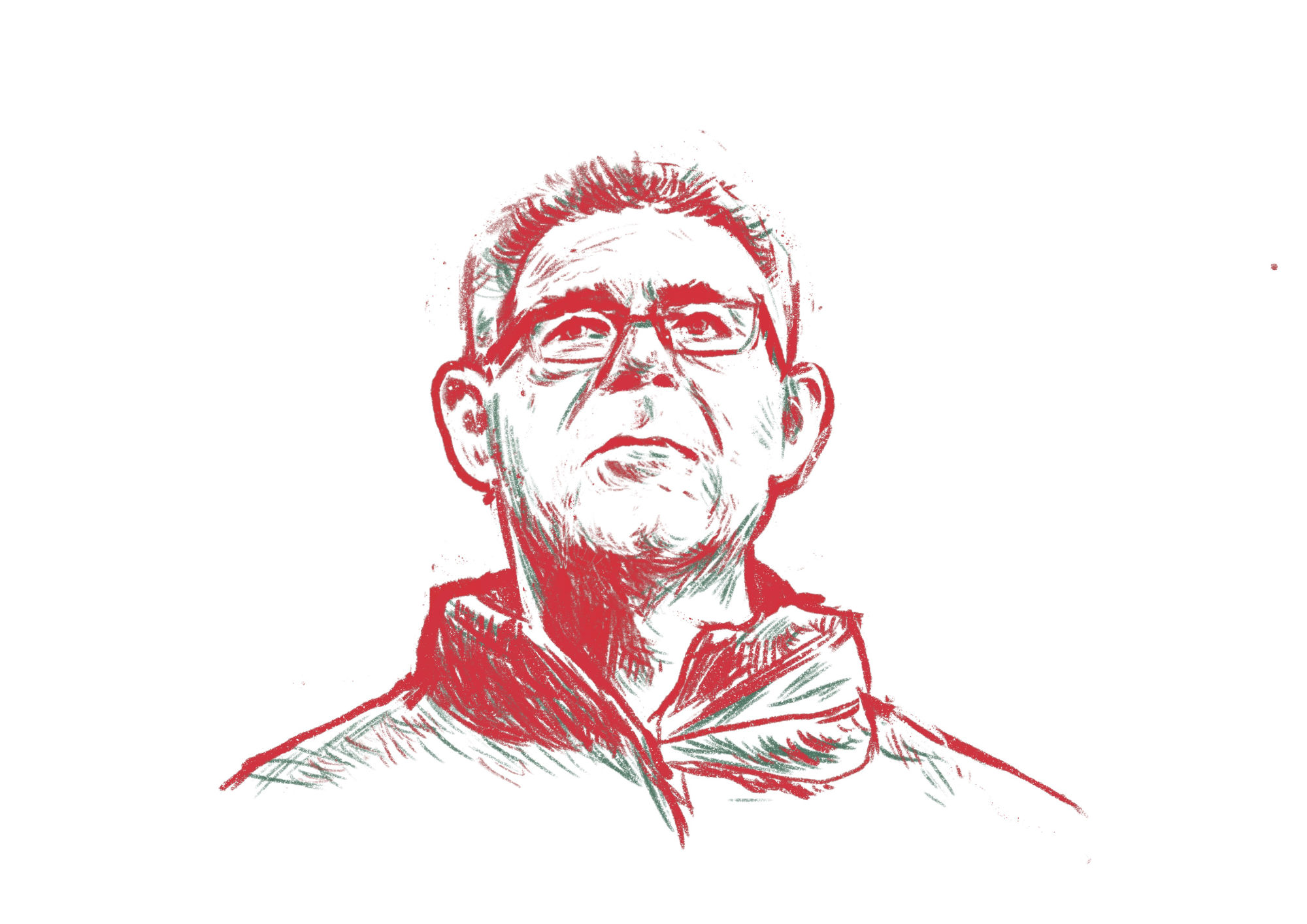
Urs Fischer’s early life in Zurich sounds pretty idyllic. He wasn’t wrapped inside of a snow globe, certainly when compared to those cosseted few who live on the shores of the eponymous lake. His future boss, Ancillo Canepa, for example, said he’d build a house on the left bank of it if really necessary, but he’d rather do so on the right, and preferably with enough space for a football pitch. For this was the kind of thing he and his would-be neighbours worried about.
The young Urs was loved and secure, and hardly needed football to drag his way out of poverty, but that’s not to say he didn’t need football. So his dad said, sure, he could play as much as he wanted as long as he finished his apprenticeship at the bank first – because, well, some stereotypes are real after all and try as we might to subvert the course of history and paint Fischer as a flighty romantic and a dreamer, it wouldn’t be true.
Of the bank he told me that it was not only “totally normal”, but that it was even valuable in its way. “It taught me if I put something in, I’ll get something in return,” he said.
And having done what was asked of him, in return he got to play. So he played and he played and he played. Indeed, Urs Fischer played 545 times in the Swiss top flight, more than most ever had or have ever since.
Christoph Kieslich has lived in Switzerland for a decade and a half, it is his home, he understands it as he knows its football and its people. He grew up there, he said. He also said that though they’ll get worked up about great sporting success, they don’t deify people only to knock them down after.
“Its different to Germany, or England, where you’re only famous when you’re successful. They do build up characters, but they are withdrawn, they aren’t under that pressure to succeed. They don’t need to be absolute heroes.“
“Fischer,” he said, ”was always back in the shadows.”
Schnell im Kopf
He’s little, Fischer, and he doesn’t look like a defender – he was largely a ball playing libero – or even a former one. His nose isn’t smashed halfway across his face for a start. But he said he was perceptive, he “always had good anticipation”.
Were you quick? I asked.
“No, no I wasn’t”.
He added however, that he was “Schnell im kopf”, which doesn’t actually sum up quite how intelligent he was as a footballer, for he saw things in the game before they happened.
It was only later, going through my notes from the press conference before the decisive second leg of the Relegationspiel against VfB Stuttgart that landed 1.FC Union Berlin in the 1.Bundesliga, I realised he’d said the same thing then as well. Then, it was “You don’t always need to be fast on your feet if you can anticipate, when you are quick in the head.”
But he had something else about him, that desire to never let his team-mates or his club down, and to keep on playing. Urs Fischer would play on until the end of the world if he thought he could nick a point out of it. He said he was “a fighter, a mentality player.” But he also had a first touch to die for, all of those games gave him a rare technical ability, and he could stroke the ball like a snooker player setting up a break.
Of course he took the first penalty
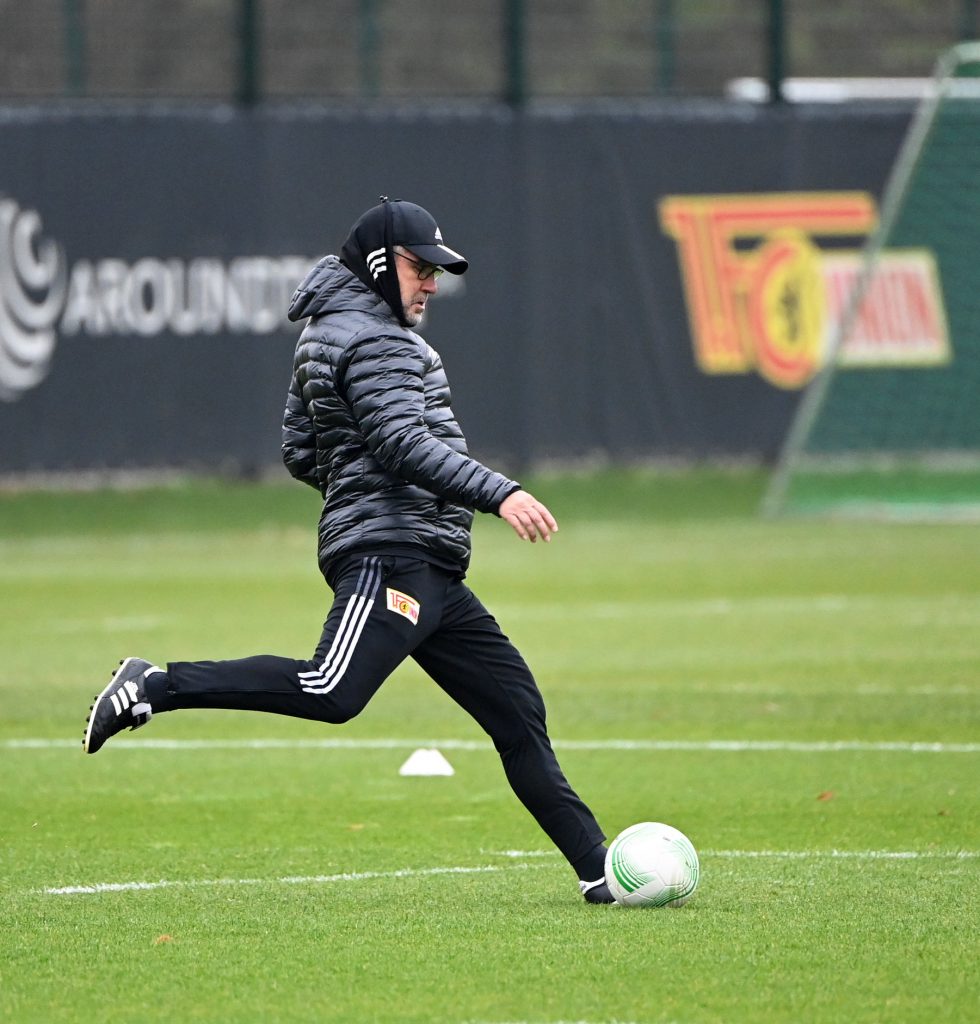
“Yeah,” he said, his sentence dripping with understatement. “I think I could bring something”.
Fischer was at FC Zurich from the age of seven. The Letzigrund was his school, his chapel, his park and his pub. They were a grand old club, perched near the top of the eternal Swiss footballing hierarchy, but they’d not won anything for a generation.
The writer and historian Fabian Brändle wrote of the man he called ‚Use‘ in his thick Zurich accent – the same one that Fischer has been fighting against since he came to Berlin, that won’t go no matter how much more confident he is speaking Hochdeutsch than when he first arrived and used words like ’schlussendlich‘ like a crutch to help him hobble his way through sentences – that he never stopped, even when his body was giving out on him. Even when the accumulation of all those hundreds of games in his legs made it feel like he was dragging a tyre around.
He’d never stop until he finally he lead them to something. It came with the Swiss Cup that had eluded them since 1976.
After extra time against Lausanne in the final, they were willed along to victory by their captain. The final whistle was blown with the scores level at 2-2, and FCZ down to ten men after South African striker Shaun Bartlett’s sending off (Fischer was booked just a minute before for unsporting behaviour, but he says he’s forgotten why now, though he was probably just trying to kill some time, or said something he shouldn’t have.)
So of course Fischer took the first penalty of the shoot-out without anyone questioning that it could be any of them. Of course he did, and of course he scored because he’d been banging them away in training throughout the build up to the game. He said so afterwards.
And of course he then let the president of the club, Sven Hotz – who lived and breathed FC Zurich, and who had assured his predecessor on his deathbed that he’d never leave them in trouble – lift up the trophy before he did. And were Swiss president, Adolf Ogi, willing to hang around that long in the crumbling, rusting, wooden-benched Wankdorf stadium, Fischer would have let all of the fans lift it before he did, too.
For it was to Hotz and to them that he dedicated that win.
He said it was slight return for 29 years of disappointment, but there was also relief. He was quoted in the NZZ as saying he’d started to doubt if he’d ever deliver them anything at all.
Brändle wrote on the Der Tödliche Pass website, “I was there on that remarkable night. Finally, after so many bitter losses, FCZ had won a title again. It was balsam for the fan’s scarred soul“.
Fischer only lasted another couple of seasons playing after that. But just as he had to finish his studies at the bank to play, he knew he had to learn afresh if he was to progress as a coach.
Fischer looked annoyed off when I suggested that he wasn’t the most patient of coaches when he finally hung up his studs. I’d read that he’d shout at the players, that he couldn’t understand it if someone wasn’t willing to put their bodies through the same battles as he did unquestioningly. That he grew frustrated at strikers who missed the target (in contradiction to something else from before the Stuttgart game, where he said “to put the ball over the line is the hardest thing in football”). It bugged him when players didn’t have his vision, his ability to know just where the ball would end up. Or worse, when they’d have to make a rash challenge, a hurried pass because they’d taken a touch too many.
I’d read all this, I was certain, and I asked him, but he took it the wrong way and I immediately doubted myself. “Where did you get that?” he asked. Of course he was patient, he said. He’d first started training the kids, the under 14’s. Then he’d worked his way up through the under 23’s, learning all the time with the diligence he’d had as a player. He’d paid his dues.
He’d worked in a fucking bank because this was all he wanted, no-one could say he hadn’t been patient.
He has grey eyes whose expressiveness comes from the folds around them. When he is irritated they look at you searchingly, like he cannot understand what it is you don’t get, when it’s so obvious. He has had spiked hair most of his life – before, he was a roundhead, and then there was a brief dalliance with a mullet that flowed with Wagnerian pomp out behind him, until he took on the haircut of an American schoolboy, a cast member of Malcolm in the Middle – and he shook the few sober spikes at the front sadly, smiling again because I had to get it now.
Hotz’s replacement, the aforementioned Canepa, a former accountant with charm and contacts, and lots of money, loved Fischer and said at the time that hiring him after his long apprenticeship to be the first team coach was the best decision he ever made.
According to Kieslich, he had tasked Fischer with a single goal: “to separate Basel from their title.” Zurich played well all season, and pushed them all the way. But it wasn’t quite enough. Ultimately, Fischer was a single loss – to “a lucky punch” – from becoming Swiss champion for the first time.
His sacking after the somehow inevitable dip in form the following year was bitter. “It’s always hard for a trainer when he’s first fired,” said Kieslich, “the first time in one’s life when someone says ciao, tchüss, fertig, its over.”
Canepa broke his heart, you know.
Fischer said he kept his head down for four months after that. He said he worried that the people would turn on him. The tracks of his tears were still clearly visible when he told kicker years later that, “the first sacking does you good, even though it’s shit. They pull the floor out from beneath you, you think the world has stopped. It’s a strange feeling, but you need to experience it.“
He found solace at FC Thun, a club who are rarely considered in the pecking order of Swiss football. They were less than a foothill to the hierarchy.
But they were well run and they clung on to their place in the top flight doggedly, even if they did tend to run through coaches like Garrincha did fullbacks. And though the Stockhorn Arena is boxy and functional, and exudes little obvious glamour, it is also just a stone’s throw from the north face of the mountain it’s named for, visible on a clear day behind one of the stands, rearing up mightily like a mighty snowcapped buffalo’s hump.
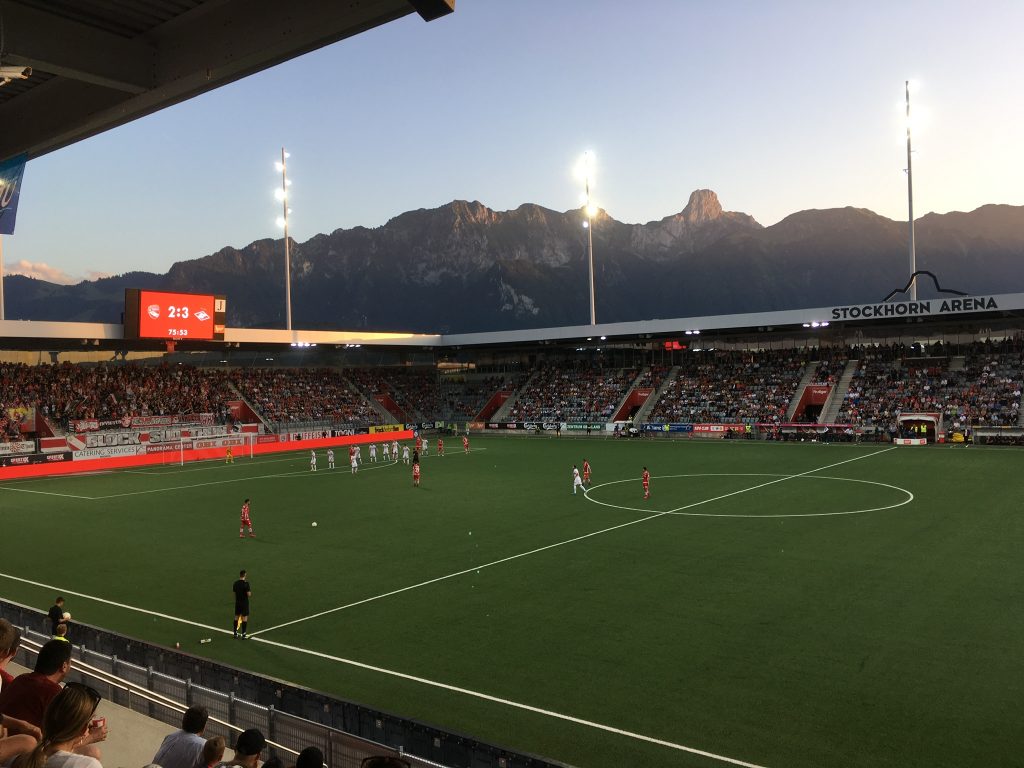
When Ernest Hemingway once described Switzerland as a country with more up and down than sideways he had this corner of the Bernese Alps in mind. From its peak you can see the Eiger and the Jungfrau and the jagged spike of the Schreckhorn. A 1536 poem by Johann Müller quoted in Francis Gribble’s The story of Alpine climbing mentions the mountain by name.
And reach the Stockhorn’s top. Whence, looking down,
Eastwards we see lakes, marshes, and a town,
The torrents of the Simmenthal – to west,
Mountains like billows on the seas broad breast.
It’s easy to see why Fischer decided to make his next steps in coaching here, and why the strength of the president’s handshake convinced him to shake off his anger and dejection towards his former boss.
That he lead Thun into fourth, and into the UEFA Cup – including a wild, vicious game against Partizan Belgrade who rained fireworks down upon the home stands – was astonishing. (When Hertha fans allowed rockets to be fired from their end at the Alte Försterei towards the Union stands Fischer barely remarked on the ugliness of the scene at all. He had seen it all before.)
Kieslich trailed off when I asked him how impressive this really was. It was “incredible, absolutely exceptional” he said, before adding another four “yeahs” and at least one more “exceptional”, though he didn’t really have to.
Urs: One of us
He took the story on. “[Basel had, meanwhile] Paolo Sousa. He’s a clever guy, and was a wonderful player, the football was fun and interesting, but he had a bit of his own agenda. Sousa has never stayed anywhere longer than two years at the most. He’s a very self important man, Paolo, he’s difficult to get close to, difficult to understand…”
He also said that Sousa himself had been just the last in a line of coaches stretching back over a period of unprecedented domestic success for Basel. But all that success also brings fear and self absorption. They were constantly terrified of wobbling in the concomitant turbulence.
They needed someone to tie everyone together, someone with his feet on the ground, who could mould a squad, several of whom who would be unhappy by default. There were international players who wouldn’t even make it to the bench, and they all had to be kept onside too. The mood of the club depended upon it.
Fischer had said with his tongue in his cheek when he signed that if they could understand the way he spoke in the Bernese Alpine country, then he was sure the people of Basel could understand him, but he was aware of the inherent danger of rejection. For you could hear it in his accent, you could see it in his stats over all of those hundreds of appearances; apart from a single, if long, spell in St Gallen the man had been FCZ since he was seven years old.
There was a riot in 2006 as Zurich won the title, in the last minute of added time of the very last game of the season, from under their host’s noses in what was dubbed the “Schande von Basel,” which merely illustrated the problem. The problem was that FCZ and FCB hated each other.
A banner was taped up on the gates to the media centre to greet him when he arrived. Written in Swiss German in big, black, spindly letters. It read:
Urs Fischer: Never one of us.
In his second season – having won the league in his first as expected – he won the double. Basel were top from the second week on and stayed there. It was a remarkable demonstration of their power and superiority over the rest of the league, but Fischer was a victim of the club’s own success, and their heightened expectations in the Champions League.
He was accused of conservatism in the press, and a new board wanted someone that would rebuild the club from top to bottom. The NZZ described his sacking, announced with half of the season still to run, as being an “emancipation from the past,” whatever that was supposed to mean.
He in turn was quoted as saying that it annoyed him how he was portrayed. That his basic values were used as a stick to beat him with.
Kieslich mentioned Roger Federer when we were talking about the perception of Swiss sporting fame. He said that he was different, he held celestial status. He said “Federer is also no longer a great national hero, he has become a global icon.”
Yet Federer was in the crowd at Fischer’s last game in charge of FCB, dressed in black, with a flash watch and a cocked eyebrow and a whiff of the landed gentry about him. The camera picked him out, though he made sure to keep himself still semi-hidden. It was as if he was conferring status upon the exiting coach. Giving him his consent to leave with honour like a Roman Emperor gifting a gladiator his life.
Fischer wore a white shirt, open collar, sleeves rolled up, with expensive blue jeans in that awkward businessman fashion middle aged men wear when they are going out. He smiled and took his applause, he clapped all four stands. It didn’t hurt as much as the last time, for he’d been prepared, he knew which way the wind had blown.
A banner was there in Swiss German in big, bright, friendly letters. This time it read:
Urs: One of us.
He said later that he’d seen it – how could he not? – and that it felt like a „confirmation,“ which is alright too because everyone wants to be told they’re good enough. He told the Aargauer Zeitung: “Who doesn’t? You too would want to be praised for your work instead of being criticised.”
Kieslich told me how he’d had a conversation with a former director at Basel who said that out of all the coaches in that unparalleled decade of dominance, Fischer was the best of the lot.
Germano Vailati was there at the time as Basel’s number two goalkeeper. He was 33 when he signed, but had been a bit of a journeyman throughout his career, wandering Switzerland and a bit of France with a pair of gloves in his pocket, his second division and Swiss cup winners medals in a box, and a tonne of fishing gear in his boot.
And he didn’t mind his reduced place in the pecking order – it was his choice to go – because it meant he would be at the most successful club in the country. He’d keep in beautiful goalmouths. He was happy. He played 14 times in six years.
“It was the best time in my career,” he said on the phone from Basel, for Vailati is not a man who needs footballing glory to thrive.
He is also the man who introduced Fischer to his only true passion outside of the game he adores, and the family he misses.
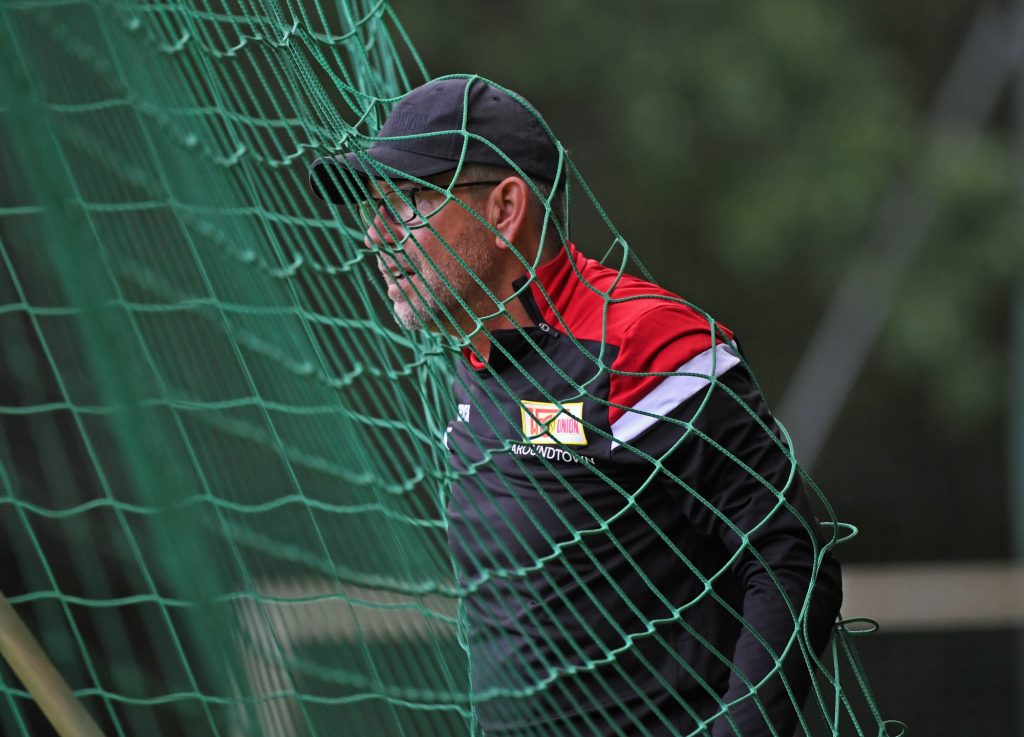
“Urs said ‚fly-fishing is not for me‘. I said ‚okay, no problem.‘ But then we went to Crans-Montana, to a small lake and he came to see what it looked like. He tried it, and said ‚oh I’m not so bad‘.” The next Monday Germano got the nod. “Please can you order all the stuff,” Fischer asked. “I want to start fly-fishing.”
He fished already. His Dad had bought him a rod for Christmas when he was a kid. “And you have to try out a present, don’t you,” he told me.
They’d get up at two and go to the Quailbrücke, built in 1895 by Arnold Bürkli. He could see the millionaires mansions snoozing, twinkling on the fringes of the lake, the city grinding itself into motion for another day. Max Frisch – originally an architect, but who became a pre-eminent playwright and author, and who was also a famous son of Zurich who had a love affair with Berlin, like Bürkli and Fischer, too – wrote of its ‚curves glinting like a crooked scythe cutting through the green, undulating landscape.‘
But the Quailbrücke would prove too central. Vailani showed him that the calcium rich waters of the countryside could prove almost a match for the manicured green of the football pitch. This was different.
Those who know about this sort of thing talk of fly-fishing as an almost spiritual quest. Beaver and herons and – in the rippling darknesses where they are happiest, away from the glare of the sunlight – trout abound. There are songs amongst the rustling of the leaves and the babbling of the water and the coolness of the air. Then silence, only the timing of your breath and the waiting, the knowledge that shadows and puffs of wind a hundred miles upstream can affect the mellifluous movements of the river, the confluence between nature and man.
“Its healthy, its easy, it not about work. Everybody is there because they want to, not because they have to be there,“ said Vailani. I asked him if they are stood in monkish silence like I imagine. „No. You watch the river, and speak about life, there’s no stress if you want to, if you have something to say… but the only focus is on the fish, on the river. It is almost impossible to fly-fish and to think about other stuff. You have to concentrate, thinking about which fly to use, what the trout are feeding on, how can I cast there…“
“One day you are in a stadium with 40 or 50 thousand people, it’s very chaotic, and the day after you are in nature with nobody and you can recharge your batteries for the week and for the next game.“
Fischer concurs. “It also helps me with my work, I can completely shut everything else out.”
You can make the best cast, the perfect fly landed in the perfect spot, but sometimes the fish still won’t bite, its belly full or its senses tingling. With the teasing and the toying, the laying of long thought out traps, there is a game there too, a competition between fisherman and fish, but both men say it doesn’t matter who wins in the end.
You can never be the perfect fisherman, and therein lies its charm, I think, for a person who works as hard as Fischer does, striving for just that from his team.
„Well, I also find it good, not to be perfect,” he says, coyly.
But in that, presumably, he is only talking about fishing.
Because of the measures to prevent the spread of the Coronavirus the press conference before Union’s first round cup game against Türkgücü near the start of the 2021-22 season was the first one, as Christian Arbeit commented immediately, to be held in the actual press room for over a year and a half. He smiled as he introduced Fischer to his right. Fischer smiled too and mentioned how nice it was to be back. He seemed to mean it, and he’s not a man who says things he doesn’t mean.
The walls there are pale mustard yellow, occasional flashes of metallic grey invoking the myths of industrial roots are painted on plastic. There is a bear on a ball and the names of Fischer and of Arbeit were written on the front of their lecterns.
There were fewer cameras now than during the flush of the first two seasons in the 1.Bundesliga, or especially that of two days before the Stuttgart game. The four rows of tables, briefly packed with journalists from outside, as well as from all over Germany, were largely empty. It was like those of us left had been kept in for detention.
There were questions, some only about tactics and injuries, others about the opposition and if Fischer had ever played in the Grünwalderstadion. (”No”, he answered, leaving it at that). And then there were others still about infection rates and capacities and tests. Fischer batted away the footballing ones, a master of talking while saying nothing. He said that Christopher Trimmel would stay on as captain because that’s what everyone wanted, and we all agreed because there is no-one finer than he, no-one more human, but also dedicated and clever enough to know how to actually improve himself and his game as he has over the last three years.
Fisher then looked a little tetchy when noting how easily a back five can become a back three with a couple of steps, and how the difference between the two was really quite minute. Because, he implied, this was pretty basic stuff.
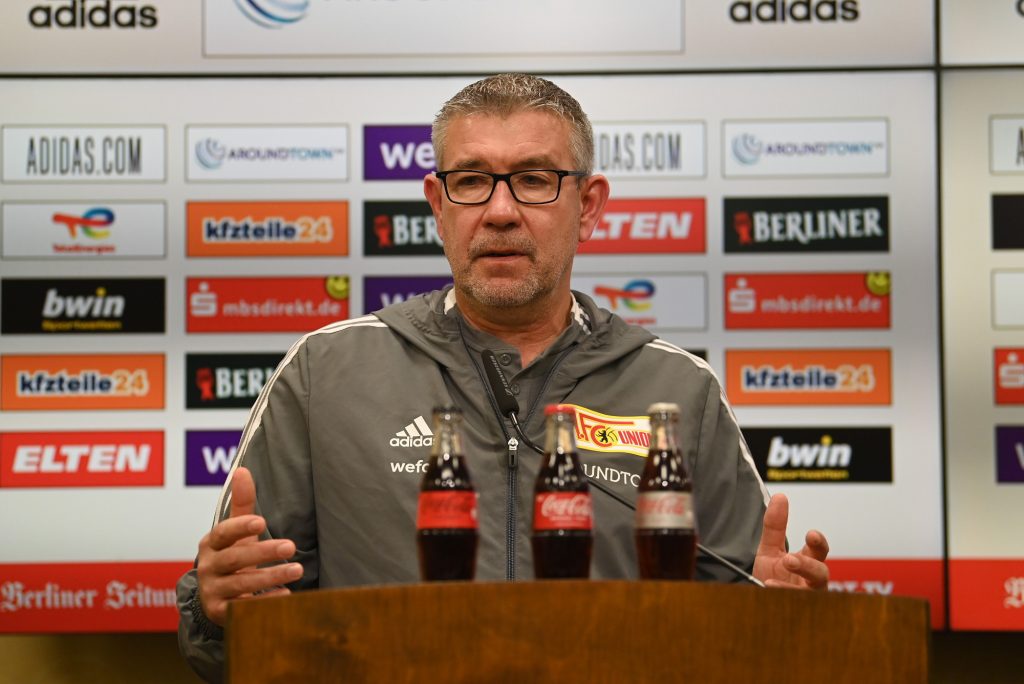
But when the inevitable virological questions were raised, the issues of health officials and politicians and scientists, he ignored them, letting Arbeit take over. Then he looked over the tops of our heads, clenching and unclenching his jaw, only his eyes betraying the fact that he wasn’t even in the room any more. He was somewhere nicer, on a football pitch, or in a shimmering and still river up to his knees with a rod in his hand and his friends in sight, laughing, chatting quietly about life and the universe and anything as long as it’s not about football.
He’s never downplayed the effects of the Coronavirus, though he has mentioned how much he missed having fans in the stadia. But, as he told me a little later, being asked about things unconnected to the game itself is just part and parcel of the job. And it is, after all, the best job in the world, and what other job doesn’t have some of that extraneous bullshit to put up with. This, Fischer knows, is a price worth paying every time. He’s said he could never go back to coaching kids because it is the pressure felt at the top of the game he feeds off. It is the stress that makes it all worthwhile.
“Yes,” he said pulled back into the press room from his reverie, “it will be hard having to play in three competitions,” but he was sure they’d be okay.
He shook hands with everyone at the end. He’s the first Union coach to make a habit of the gesture. It’s a nice touch, Claudio Ranieri does it too. I first thought that he did it because though it might not mean the press won’t turn on you when your team stops winning, it might just make the bastards a little more amenable to you on the way down.
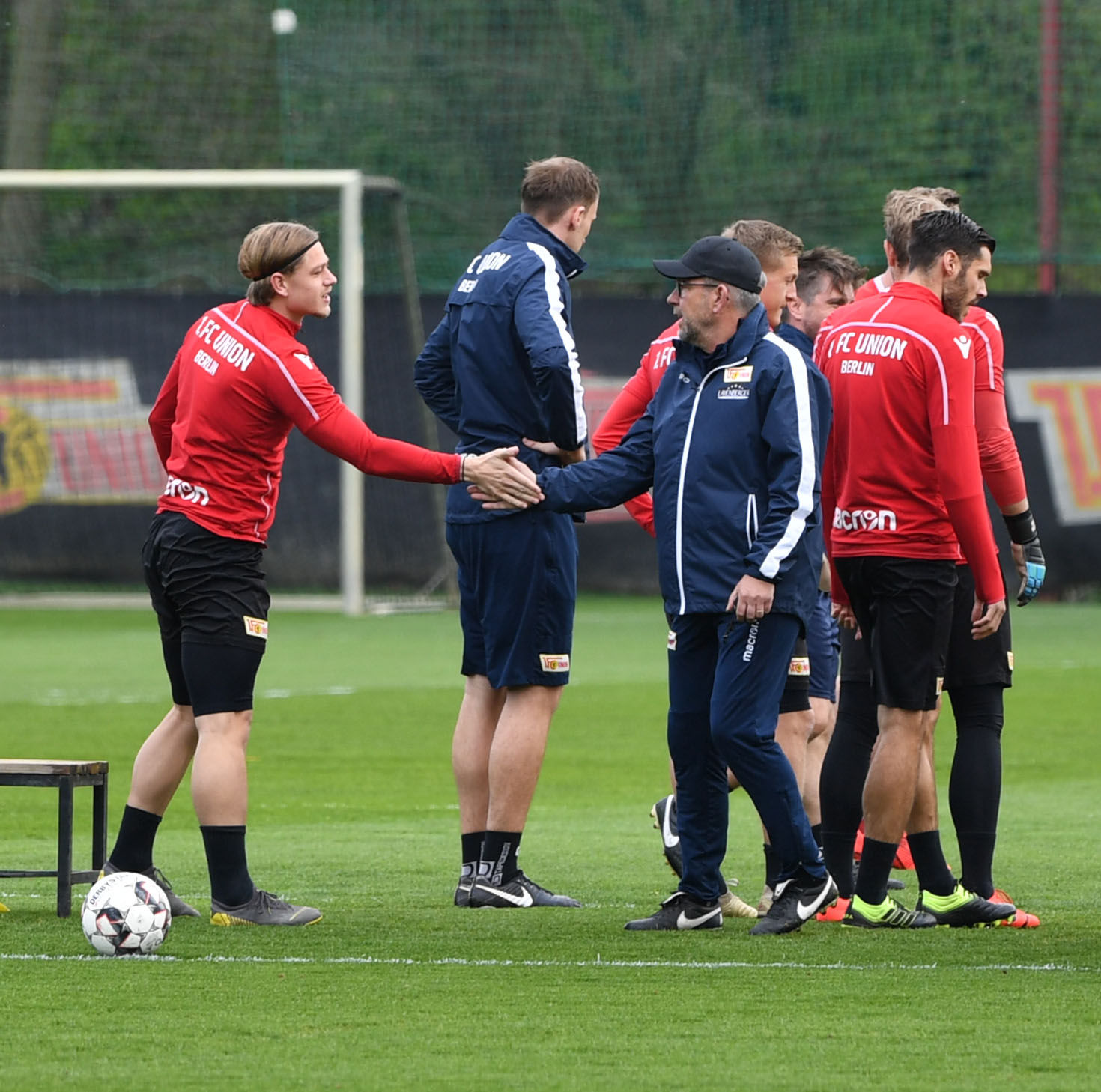
But then he said to Christoph Biermann in his essential, fly on the wall book, Wir werden ewig leben that the worst thing about lock-down was the lack of human contact. He liked hugging his friends he said.
Biermann spent a year following Fischer around as he detailed Union’s first (though most expected it to be their only) season in the 1.Bundesliga. He first wrote about the club in depth however back in 2013 when he did a cover story for 11Freunde.
Looking back on that piece there are things you don’t see any more that jump out immediately: the images of Jochen Lesching selling programs, of Torsten Mattuschka on the pitch and the plastic tunnel snaking its way from out back onto the pitch as the new unbuilt stand springs up behind it. He mentioned derbies against Hertha BSC in the second division.
And in the starting sentences he asked Wie geil ist es eigentlich, wenn 25,000 menschen singen?, not knowing that ‚geil‘ was to be exactly the word that Fischer would use to describe the atmosphere on the night a decade later that Union drew 0-0 against Stuttgart, and ensured participation in the top flight after all.
Yes, “geil” was indeed the perfect word – as the flares burned and the people paraded around on the pitch with their chests puffed out, hugging, singing – just as it was when Biermann chose it. Fischer later said that night was like a film, that the images of the Alte Försterei in that moment, would remain embossed on his memory forever.
The change that has been brought about since Urs Fischer has been at 1.FC Union Berlin would have been inconceivable when 11Freunde published that story. But as every fisherman knows, you can never stand in the same river twice.
I asked Biermann what it was that set Fischer apart, what was it that had allowed him to do what he had?
„I think tactically he is very good,” he replied. “And I think he has a genuine understanding of football, of what’s going on on the pitch… But I think it’s not only this. He knows how to teach it, which is the difficult part. Because it makes a difference sometimes if you’re one metre to the right or one metre to the left or one metre back, and he knows that and can explain that. “
Fischer can get the players to perform expressive jobs within seemingly rigid structures. From the impossible reaches of the top deck of the Olympiastadion the lines drawn out on the pitch by his team looked like architectural drawings.
I wanted to know how Fischer has helped to drag Union to success, a club so rooted in their own rebellious mythology that it has often held them back. Biermann said his direct influence is limited to their sporting department, but through his professionalism, and extensive delegation, he has brought everyone else along with him.
Vailati said, “He’s got a good heart, he’s very clear. You can go out with him, drink a coffee and speak about everything, he was always like this, with the best player on the team or the one who only plays a few times. For him it was very important that the person – the man – comes before the player.”
„But I also find his ability to develop a sense of what’s going on with individual players, of what’s going on with the team, to have an eye on this positive atmosphere… I think he is simply a very good man manager… He’s outstanding,“ said Biermann.
It’s how someone like Christopher Trimmel could not only flourish as a captain, but could also improve to the extent that he has. How that ‚metre here, metre there‘ level of instruction, has changed him as a player.
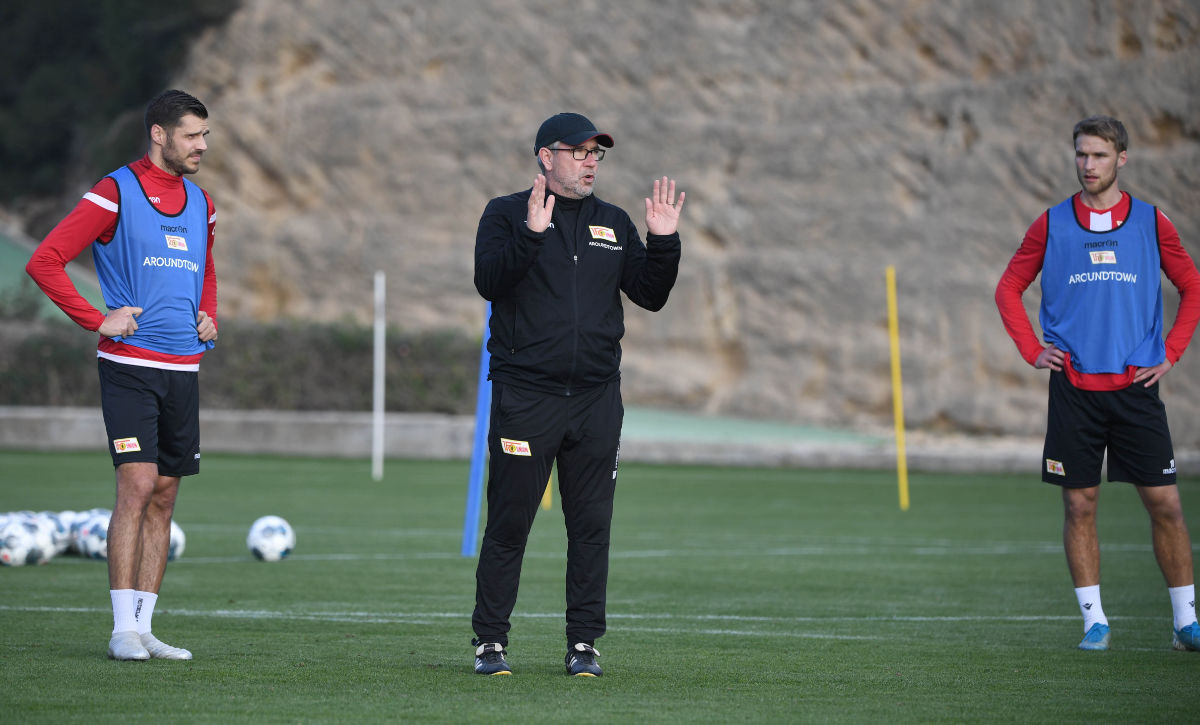
In the book Biermann tells a story where Trimmel went to a birthday party for a dying friend of his. With a faltering voice she had asked him for a tattoo of an elephant – the strongest of the animals, she’d said – and the night lasted on until the early hours as with caring hands he gave matching ones to seven others in the party.
It offered a glimpse of humanity and of artistic feeling that one doesn’t expect in the retelling of a Bundesliga season, of a world of alpha males. Biermann lived close to Trimmel, they spent some time together, and one gets the sense that the writer had more in common with the almost bohemian right-back than with many others in Union’s milieu, and he says the player himself deserves a great deal of credit for his determination to be all he can be.
But credit is also due to Fischer who gave him the space to breathe and the responsibility to thrive.
The goal he scored in the deluge at the Olympiastadion against Feyenoord was a thing of thunderous beauty, utterly fitting to the occasion. 1-0 down to a side who the fans had grown to despise over the previous fortnight, Union shot twice, three times, swarming suddenly all over the final third of a sodden pitch that the ball, that’d lost all its composure, wouldn’t run on, that had shallows and pools near the corner flags. It was grim out there, the wind fought against everyone. The ball pinged around, out of control, and threatened to do so in perpetuity until Trimmel struck it full, a shot that stopped rising only when its momentum was ultimately broken by the net.
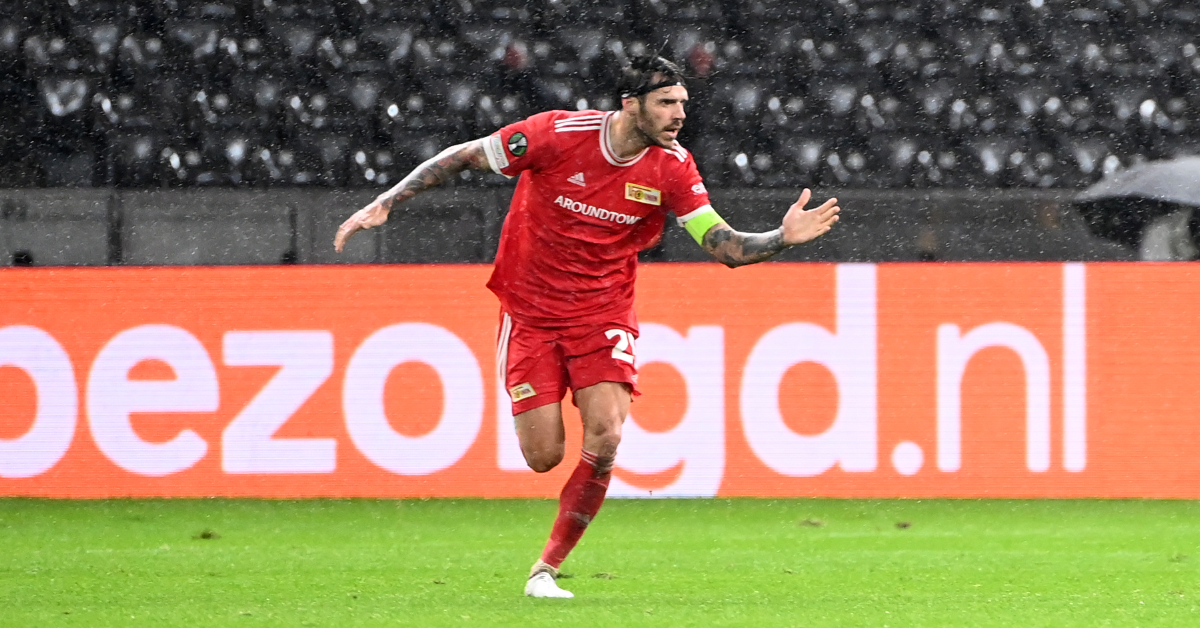
Union had been outplayed for much of the game. It wasn’t overwhelmingly so, but the Dutch side were cannier and seemed better used to this stuff. Trimmel’s goal offered a chance, even if one ultimately unused.
His boss even halted his pacing and his pointing, and gave pause to the instructions and whistles and barks and yips in the face of the storm that made him look like Jack London’s elemental captain, Wolf Larsen, in ‚the Sea Wolf‘, up on deck for a moment to celebrate.
‚His hands gripping the spokes and holding the schooner to the course of his will, himself an earth God, dominating the storm. Flinging its descending waters from him and riding it to his own ends.‘
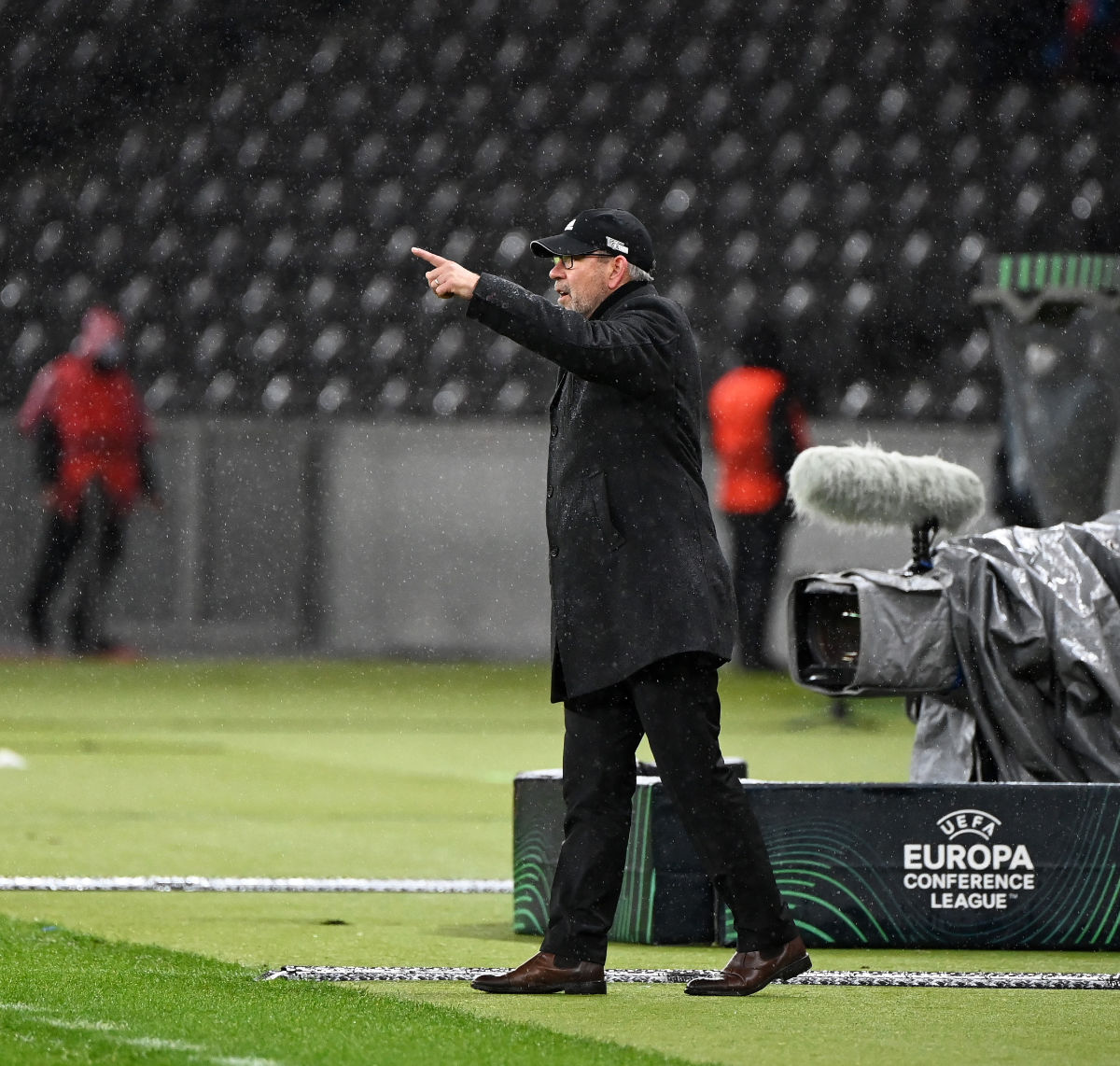
Correspondingly, Trimmel’s goal at the Alte Försterei in the derby against Hertha a few weeks later was from a similar distance, but a different angle, and on his ’natural‘ side of the pitch. This one he hit before the ball bounced for a second time, following a deep, outswinging corner, through the box towards the back post, driven low through the crowd.
He’d scored for Austria in a World Cup qualifier just a few days before, too. In late 2021, Christopher Trimmel was doing a good impression of being one of the best full-backs in a land full of them. His tail was up.
Christoph Kieslich told me a story – he said it might help me understand Fischer – about how for sixteen years now, he’s played five-a-side once a week with the Basel former sporting director, Georg Heinz. They’d go for a pint and a schnitzel afterwards. It had helped the German writer settle, because he missed his home and his friends and his routines, and it’s hard moving to a new country where the language is like yours, but not quite the same.
And Fischer turned up a few times.
“He was probably 49, 50. Of course he understands the game, he played five hundred times in the top flight. We played to a slow rhythm, but had fun, no tackling because we all had to go to work the next day, but there was still a bit of spirit, we let the ball run… It was fascinating in many ways, Urs had so much class, although he was a defender, he is the kind of guy who can play without training, nothing… his touch on every single ball was perfect, the ball was safe with him. He played always the correct pass. No dribbling, even there. He was unpretentious, authentic.”
“I remember one game we were playing first to ten,” he continued, “and at 9-9 Urs scored the tenth with an unbelievable volley, and he ran around the pitch celebrating.” He painted a picture of Fischer charging across the pitch in mock glory. And afterwards in the pub he was just like one of them, taking the piss, relaxed, easy.
Biermann is still clearly impressed by him, and I don’t think it’s easy to impress Biermann. He has been writing about football at the highest level, levels higher than Union have ever achieved throughout most of their meagre history, for a long time.
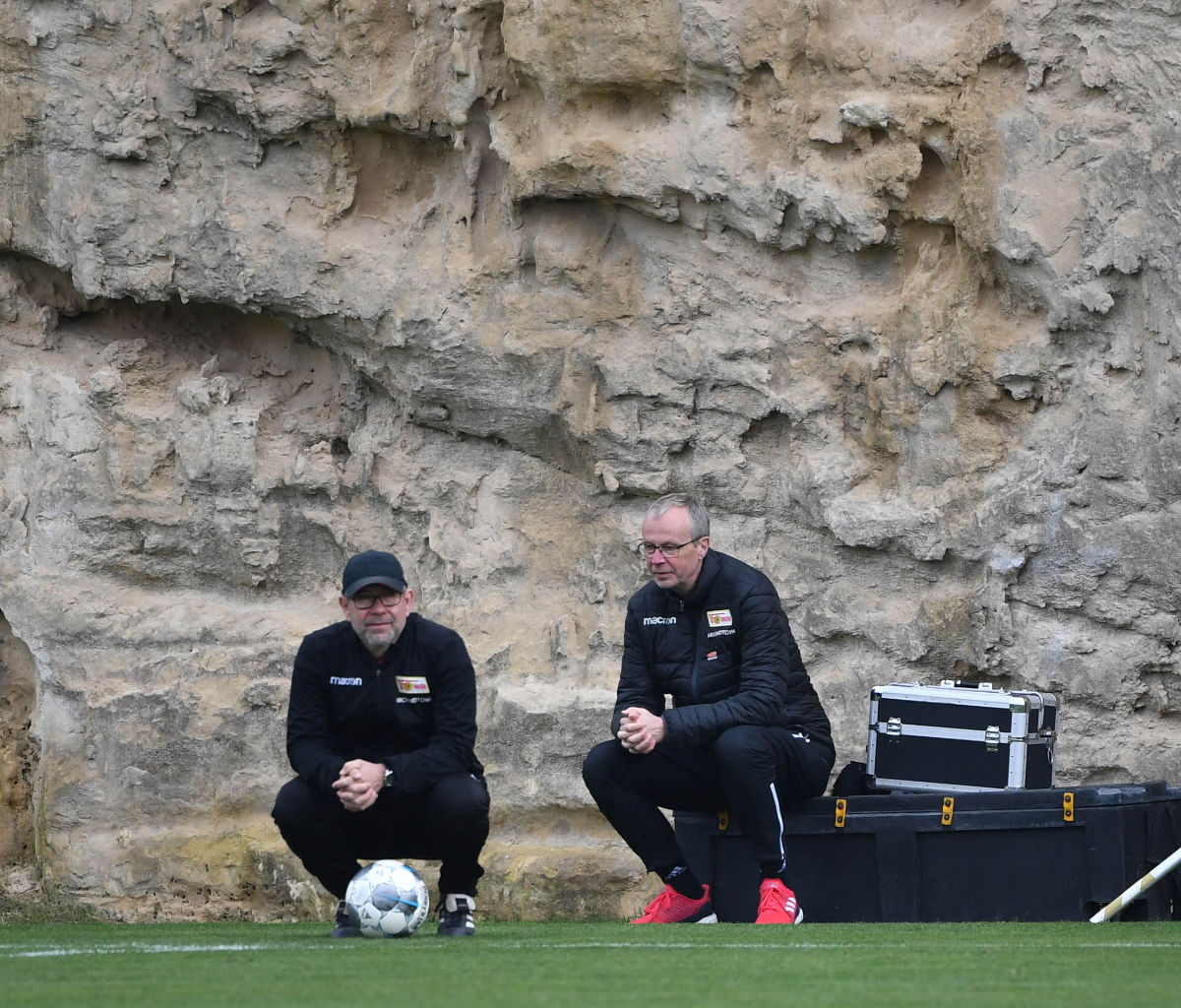
What were your first impressions, were you intimidated by him? I asked, having been exactly that, myself. „No,” he said. “The only time I was, and also by Markus Hoffman, was towards the end of the season when they were having a dip and a semi crisis, then I found them unbearable. There was a lot of tension there that I found difficult to cope with. But, no, I was never intimidated.“
The mention of Hoffman, his co-trainer, is important. His football career is different to Fischer’s. He didn’t have the luxury of spending all his time at so few clubs, of appearing week after week, a beloved name written in blood on the team-sheet. He was a lower-league striker who struggled for goals. He scored two in 35 appearances for for Wacker Burghausen, one of which was in a 5-1 loss away at SSV Reutlingen. It was the equaliser, two minutes into the second half and he was sent off 18 minutes later. So was another of his teammates. And so was his coach.
His is a constant presence, Fischer’s colleague, fishing companion (he was there the day Germano first took them to the lake), his fellow schemer, tactician, analyst and football obsessive (as he was when they played five-a-side in Basel). But he is also his closest friend in a city they inhabit only to work in.
Without Hoffi, one suspects, Fischer would be nothing there.
Kieslich said, “It’s no secret that every night he is with Markus, what the two of them do is serious work. It is maybe more, but no less. It’s work.”
For Urs Fischer is not in Berlin for the glamour or the rush of hearing commercial techno made to sell cars to, played in overpriced bars full to the brim with footballers. Nor is he there to observe the constant movement of a city that Karl Scheffler described in 1910 as “damned always to be becoming, and never just being.”
When I asked Biermann if he had felt himself grow closer to Fischer, the way he clearly had to Trimmel, over the course of that season, he said, “I think that nobody is really getting close to him, and I think that is a part of how he does what he does… Well, to say it, he sounds a bit aloof or far away, and that’s not true, but I think he sees it as a kind of professional duty to keep a certain distance from the players and from the staff and the president, and everybody at the club, so that things don’t become emotional in a way.
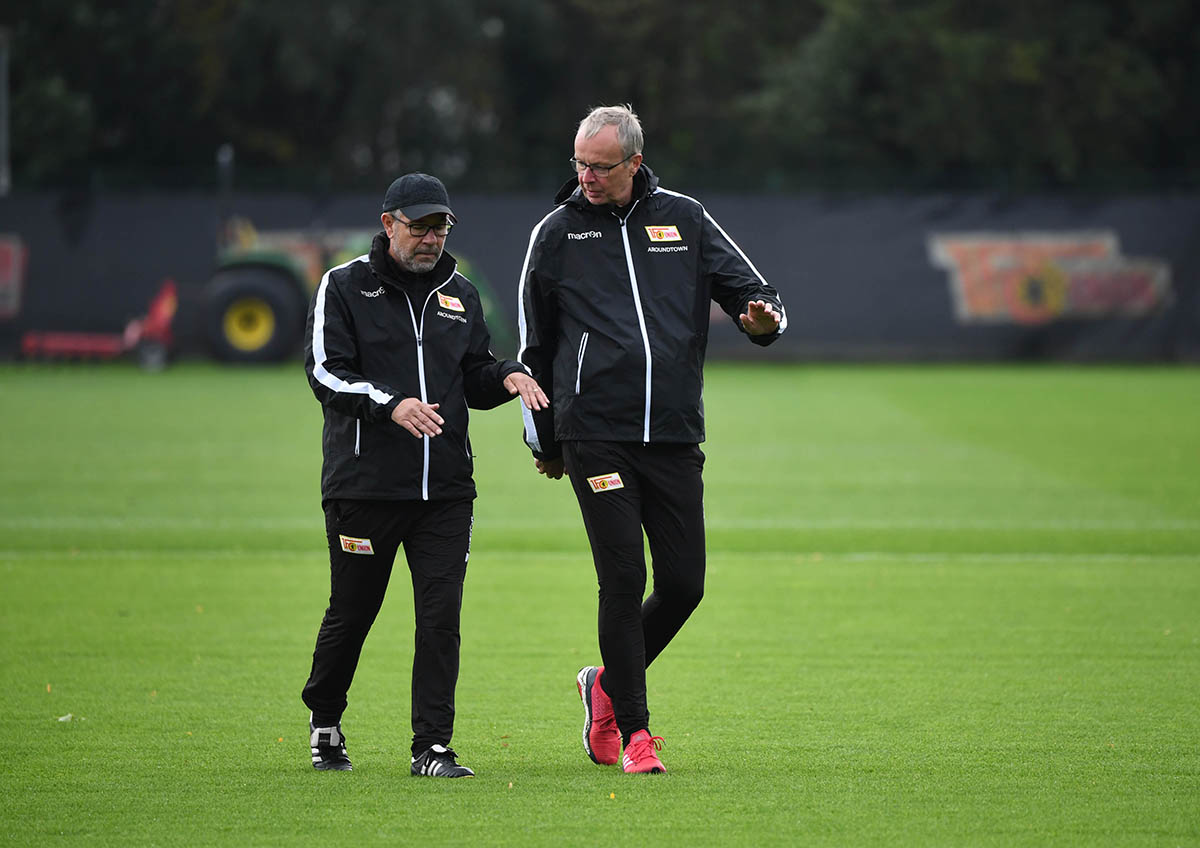
He was very kind to me and everything, but he didn’t want to be my friend, there were limits as with the others. And I think he is very aware of what’s going on with the people he is working with, and most of them are happy too because he gives them space.”
It is about knowing, as he said, where to draw the line.
According to a slightly bizarre puff-piece in the magazine, Blick, Fischer lives in Köpenick, on the Spree, in a clean flat with sleek but austere black furniture he’s had carried across the Alps so it feels a bit more like home. His grown daughters have a small room with twin beds made up for when they come to stay. He says how much he misses his wife.
He still smokes occasionally and he likes a glass of wine, and he eats spaghetti in the evenings while watching football on the TV. He has a coffee there first thing in the morning on his own, before he goes to the office down the road in the belly of the stadium, driving the short distance every time.
It’s an almost ascetic existence – almost – and there’s something sad about it. But Fischer has to do it like this, it is all in the name of the work to be done.
I think this is what lead to the point when they became, according to Biermann, ‚unbearable.‘ He wrote:
“Before the season Fischer had warned me that there could be moments when he became ‚thin skinned’…” He described the build up to a Schalke game. “They weren’t loud, crashing about, but there seemed to be a darker force at work inside of them, that either wasn’t there before, that I’d missed, or that they’d managed to keep hidden from me.”
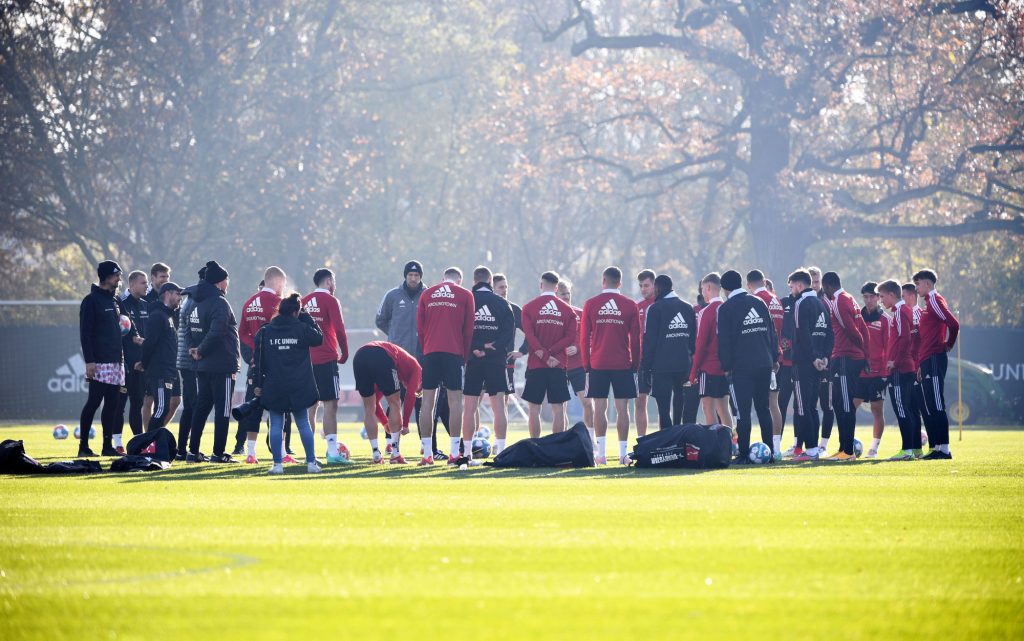
In one of the very few interviews he’s done for the Union programme (Fischer’s absence is notable from most of them) he said his favourite record was The Temptations‘ ‚Papa was a Rolling Stone‘. This was remarkable not only because I hadn’t had him down as a psychedelic soul sort of a man. But also because it is a song about betrayal, about lies, and about a man who seems to be the opposite to everything I have come to expect from Fischer.
Yes, he probably chose it because it is damn close to being the pop-cultural high water mark of the 20th Century, but still, its story runs contrary to that most important of all things to him.
My last question was about loyalty. I’d asked how important it is, in football as in life.
„[Loyalty is] the most important thing of all”, he said. “I think without loyalty there’s no community. I think if someone, he’s not loyal, then…”
“But do you think sometimes….” I started, but he pre-empted me and broke in.
„No…. bye. Its over. Draw a line under it. ‚Good bye,’” he said bluntly. “I think it’s a prerequisite in work.“ He trailed off, unable to countenance such a thing, such a stupid question.
I wondered if that made him a little old fashioned in this belief, in modern football?
„Am I what?“
I said I didn’t see much loyalty in football any more.
„Ooooh, of course. Every day. Look at the daily work in my trainer team. I think if you’re not loyal then no one would work three years together… Oi, oi, oi… There’s no chance, no chance, none. None”.
He’d been reduced to mere syllables, disbelieving that I could be so cynical when everything he does, his whole universe, revolves around this most basic of human principles. He couldn’t imagine it. His voice didn’t rise in irritation, it dropped a little deeper and he looked at me as if to ask if that was that, in a similar way he does to Christian Arbeit at the end of the press conferences, and I thanked him for his time. We exchanged a couple of pleasantries and he said goodbye.
But before he did I swear I saw him shake his head at the very idea.
Entdecke mehr von Textilvergehen
Melde dich für ein Abonnement an, um die neuesten Beiträge per E-Mail zu erhalten.
0 Kommentare zu “Fisher King”